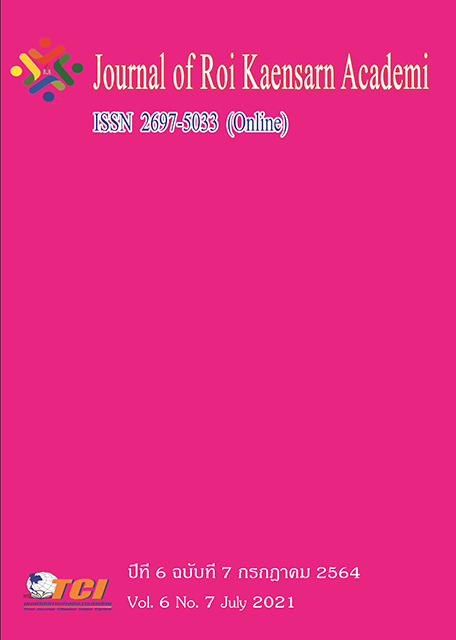Responsible Digital Citizenship: Safe and Respectful Online Community Life
Main Article Content
บทคัดย่อ
The world in the 21st century is in the digital technology era, where both society and technology are changing rapidly. A variety of technological tools and applications have taken part in creating a style or way of life for the new generation, often referred to as “Digital Citizens.” They can undertake many activities anywhere over the Internet. However, as much as this has made things easier and faster, it also has detrimental effects. It is therefore important for everyone to be educated in digital citizenship. This study evaluates the concept of digital citizenship as the most influential concept in the 21st century. As nations engage in technological improvements, they need to ensure that students have the digital literacy and civic skills to use online learning possibilities effectively. This includes assisting students in assessing the source and authenticity of Internet materials, and practicing safe and ethical online conduct. In addition, schools may play a key role in teaching, enabling, and involving students in ICT best practices. Guiding children and young people safely, effectively, critically, and ethically in a world full of social media and digital technology is a responsibility for educators worldwide. The concept of digital citizenship has expanded to include several skills, features, and conduct that use the advantages and possibilities offered by the online environment, while creating resistance to any hazards. This study evaluates scholarly views on digital citizens, and provides a critique that will help students and teachers understand the proper, ethical, and professional behavior of digital citizens.
Article Details
เอกสารอ้างอิง
Al-Zahrani, A. (2015). Toward Digital Citizenship: Examining Factors Affecting Participation and Involvement in the Internet Society among Higher Education Students. International Education Studies. 8 (12), 203-217.
Bouzguenda, I., Alalouch, C., & Fava, N. (2019). Towards intelligent, sustainable cities: A review of the role digital citizen participation could play in advancing social sustainability. Sustainable Cities and Society, 50, 101627.
Global Digital Citizen Foundation. (2015). Digital citizenship school program. Retrieved from https://globaldigitalcitizen.org/digital-citizenship-school-program.
Isman, A., & Gungoren, O. C. (2013). Being a digital citizen. Procedia-Social and Behavioral Sciences. 106, 551-556.
Isman, A., & Gungoren, O. C. (2014). Digital citizenship. Turkish Online Journal of Educational Technology-TOJET. 13 (1), 73-77.
Kara, N. (2018). Understanding university students' thoughts and practices about digital citizenship: A mixed-methods study. Journal of Educational Technology & Society. 21 (1), 172-185.
Kim, M., & Choi, D. (2018). Development of youth digital citizenship scale and implication for an educational setting. Journal of Educational Technology & Society. 21 (1), 155-171.
Lauricella, A. R., Herdzina, J., & Robb, M. (2020). Early childhood educators’ teaching of digital citizenship competencies. Computers & Education. 158, 103989.
Net safe. (2018). New Zealand teens and digital harm: Statistical insights into experiences, impact and response. Online. Retrieved march 14, 2021. From: https://www.netsafe. org.nz/NZ-teens-and-digital-harm_statistical-insights_2018.pdf.
Palacin, V., Ferrario, M. A., Hsieh, G., Knutas, A., Wolff, A., & Porras, J. (2021). Human values and digital citizen science interactions. International Journal of Human-Computer Studies. 149, 102605.
Pardo, A., & Siemens, G. (2014). Ethical and privacy principles for learning analytics. British Journal of Educational Technology. 45 (3), 438-450.
Ribble, M. (2015). Digital citizenship in schools: Nine elements all students should know. International Society for Technology in Education.
Simsek, E., & Simsek, A. (2013). New literacies for digital citizenship. New educational technology. 4 (2), 126-137.
UNESCO. (2014). Fostering digital citizenship through safe and responsible use of ICT: A review of current status in asia and the pacific. The United Nations Educational, Scientific and Cultural Organization.
UNESCO. (2015). Global citizenship education: Topics and learning objectives. The United Nations Educational, Scientific and Cultural Organization.
Wright, S. (2008). Digital citizenship: The internet, society, and participation, by Karen Mossberger, Caroline J. Tolbert, and Ramona S. McNeal, Journal of Information Technology & Politics. 5 (2), 262-264.
Xu, S., Yang, H. H., MacLeod, J., & Zhu, S. (2019). Social media competence and digital citizenship among college students. Convergence. 25 (4), 735-752.

